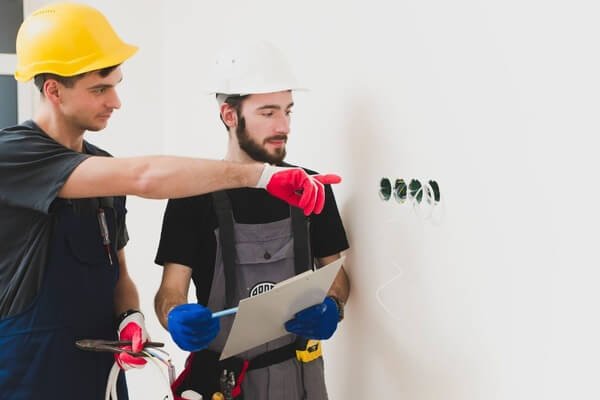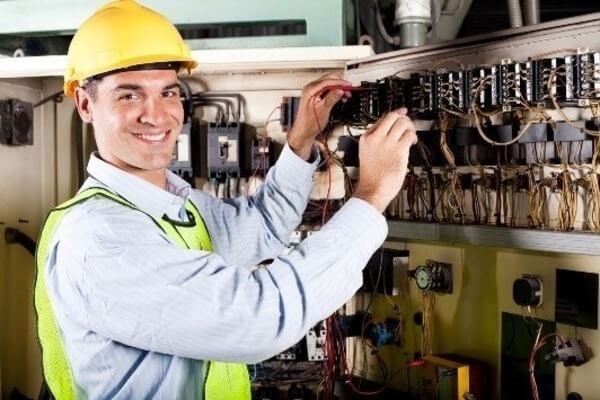The difference between a basic electrician and a sophisticated electrical contractor becomes more apparent when looking at modern industrial and commercial electrical projects. Today’s infrastructure needs require engineering expertise, project management and technical knowledge that goes beyond the traditional electrical installation work.
Professional electrical contractors are the backbone of industrial development, managing complex power distribution systems, advanced automation technologies and mission critical electrical infrastructure that drives economic growth. They combine deep technical expertise with project execution capabilities to ensure complex installations meet performance, safety and reliability requirements.
The evolution of electrical systems from simple power distribution to intelligent, connected networks has changed the role of electrical contracting professionals. Today’s projects require integration of multiple technologies including building automation, power quality solutions and complex control systems that need specialized expertise and experience.
Knowing the capabilities, methodologies and value proposition of professional electrical contracting services is key for facility managers, project developers and industrial operators planning large electrical infrastructure investments.

Professional Electrical Contractor Capabilities
Project Engineering and Design
Professional electrical contractors distinguish themselves through comprehensive engineering capabilities that encompass load analysis, system design, and performance optimization. These organizations use registered professional engineers that have knowledge on the intricacies of power distribution, motor control and automation systems of industries.
The proper electrical system design is based on load flow analysis and fault current calculations. Advanced modeling software is used by experienced contractors to model with confidence on how systems will perform under different operating conditions with appropriate protection coordination and safety margins.
The analysis of power quality has gained significance because facilities are also installing sensitive electronic equipment and variable frequency drives. Professional contractors are aware of the harmonic implications, the power factor requirements, and voltage regulation needs that affect the design of systems and equipment selection.
The activity of specification development and vendor coordination is done to make sure that the requirements of the project are clearly understood and communicated accordingly to the project stakeholders. The process eliminates the ambiguity and guarantees that the supplied systems satisfy the demands of operations and performance requirements.
Specialized System Integration
Industrial automation integration represents a growing area of expertise for advanced electrical contractor company operations. These projects require understanding of programmable logic controllers, human-machine interfaces, and communication networks that connect manufacturing equipment with facility management systems.
Motor control center design and installation involves sophisticated understanding of protective devices, starting methods, and control logic that ensures reliable operation of critical industrial processes. These installations require coordination with mechanical systems and process control requirements.
Power factor correction system implementation requires specialized knowledge of reactive power compensation, harmonic filtering, and utility interconnection requirements. Professional contractors understand the complexities of modern correction technologies and their integration with existing electrical systems.
Building management system integration involves coordination between electrical systems and facility automation platforms. This integration requires understanding of communication protocols, control strategies, and performance optimization techniques.
Quality Assurance and Testing
Comprehensive testing procedures distinguish professional contractors from basic electrical installation services. These procedures include insulation resistance testing, ground fault testing, and protective device coordination verification that ensures system safety and reliability.
Commissioning services ensure installed systems operate according to design specifications and performance requirements. Professional contractors utilize systematic testing procedures that validate control sequences, protection settings, and integration functions.
Documentation development includes as-built drawings, test reports, and operating procedures that support ongoing system maintenance and operation. Proper documentation facilitates troubleshooting and enables effective system management throughout the operational lifecycle.
Training programs ensure facility personnel can operate and maintain installed systems effectively. Professional contractors provide comprehensive training that covers normal operation, emergency procedures, and basic troubleshooting techniques.
Selecting Electrical Contractors for Complex Projects
Evaluation Criteria and Qualifications

Certified electrical contractor credentials provide assurance of technical competency and professional standards adherence. Master electrician licenses, professional engineering registrations, and industry certifications demonstrate commitment to professional excellence and ongoing education.
Project experience in similar applications provides valuable insights into potential challenges and optimal solutions. Contractors with relevant experience can anticipate problems and implement proven strategies that reduce project risks and improve outcomes.
Financial stability and bonding capacity indicate contractor capability to complete large, complex projects without financial constraints. These factors become particularly important for projects with extended timelines or significant material procurement requirements.
Safety record evaluation reveals contractor commitment to worker protection and professional practices. Low experience modification rates and comprehensive safety programs indicate professional operations that minimize project risks.
Technical Expertise Assessment
Power system analysis capabilities demonstrate contractor understanding of complex electrical phenomena and system interactions. Advanced contractors utilize sophisticated analysis tools and techniques that ensure optimal system design and performance.
Equipment specification expertise ensures appropriate technology selection for specific applications and operating conditions. Professional contractors understand equipment limitations, compatibility requirements, and performance characteristics that impact long-term system success.
Code compliance knowledge encompasses local, national, and international standards that govern electrical installations. Professional contractors maintain current knowledge of evolving requirements and ensure installations meet or exceed applicable standards.
Project management capabilities include scheduling, resource allocation, and quality control processes that ensure timely, efficient project completion. These capabilities become critical for complex projects with multiple stakeholders and interdependent activities.
Industrial and Commercial Applications
Manufacturing Facility Requirements
Special electrical infrastructure is needed to host manufacturing equipment, process control systems and material handling automation. Professional electrical contractors understand the unique requirements of different manufacturing processes and can design systems that support operational efficiency and flexibility.
Manufacturing equipment motor control systems need advanced starting technique, ability to control the speed and protective features that warrant dependable operation under changing loads. Such systems need to interconnect with production control networks, and at the same time have local control capabilities.
Emergency power systems maintain the ongoing crucial manufacturing processes during utility failures. Professional contractors are also aware of the intricacies of generator sizing, transfer switch coordination and load prioritization that provide effective emergency operation.
The considerations of maintenance accessibility affect the design of the systems and equipment arrangement. Professional installations also give sufficient space and access to maintenance in progress as well as safety of the workers working during the service processes.
Commercial Building Infrastructure
Commercial facilities require electrical systems that support diverse loads including HVAC equipment, lighting systems, and information technology infrastructure. These systems must provide reliable power while enabling energy management and operational optimization.
Lighting control integration enables sophisticated energy management strategies while maintaining appropriate illumination levels for different space types and usage patterns. Professional contractors understand the complexities of lighting control networks and their integration with building automation systems.
Power distribution design for commercial buildings requires careful consideration of load diversity, expansion capabilities, and maintenance accessibility. These factors influence panel board locations, feeder routing, and protection device selection.
Technology infrastructure support includes provisions for data networks, telecommunications systems, and audio-visual equipment that increasingly define commercial building functionality. Professional contractors coordinate these systems to prevent interference while ensuring adequate power quality.
Data Center and Critical Facilities
Mission-critical facilities demand electrical systems with exceptional reliability and performance characteristics. Professional contractors understand the unique requirements of these applications including redundancy strategies, power quality specifications, and monitoring capabilities.
Uninterruptible power system (UPS) integration requires sophisticated understanding of battery systems, inverter technologies, and bypass arrangements that ensure continuous power delivery during utility disturbances or equipment maintenance.
Grounding and bonding systems for sensitive electronic equipment require specialized knowledge of electromagnetic compatibility and signal integrity considerations. Professional installations minimize interference while ensuring personnel safety and equipment protection.
Environmental monitoring integration provides early warning of conditions that could impact electrical equipment performance or reliability. These systems monitor temperature, humidity, and other environmental factors that affect equipment operation.

Regulatory Compliance and Standards
Licensing and Certification Requirements
There must be proper licensing and certification of the electrical contracting profession depending on the jurisdiction and the scope of the project. A licensed electrician near me must ensure that the licensing is in progress and the authorized work.
Continuing education requirements is a way of ensuring that contractors can keep up to date with the changing codes, standards and technologies. Professional contractors make a commitment of continuous training which increases technical skills and quality of service delivery.
Insurance and bonding are the protection of the customer against possible difficulties and the display of financial capabilities and reputation of the contractor. Proper levels of coverage show that there are serious professional operations.
The quality management systems help to show the commitment of the contractor to the consistency of service delivery and constant improvement. Such systems contain written instructions, performance measures and customer feedback systems.
Code Compliance and Safety
The main basis of professional electrical work is the adherence to the national electrical code, and its experienced contractors are aware of the letter and spirit of requirements. Safety and legal protection of all the stakeholders in the project will be granted by code compliance.
The existence of local code variations and amendments necessitates that the contractors keep up to date in the specific requirements of the jurisdiction. Professional contractors are familiar with these differences and are able to make sure that installation complies with all the possible standards.
Safety programs at the workplace safeguard employees as well as present professional work and risk management. Thorough safety programs help mitigate the risk of accidents on the projects as well as enhancing project efficiency and quality.
The process of inspection coordination guarantees the code compliant work and professional standards are achieved. Professional contractors collaborate with inspection authorities to facilitate an easy process of project approval and occupancy.
Technology Integration and Future Trends
Smart Building Technologies
The integration of smart building technologies requires electrical contractors to understand communication protocols, cybersecurity considerations, and system interoperability requirements. These technologies transform traditional electrical systems into intelligent networks that optimize building performance.
Internet of Things (IoT) device integration enables comprehensive monitoring and control capabilities that extend beyond traditional electrical functions. Professional contractors understand the infrastructure requirements and integration challenges associated with these technologies.
Renewable energy integration requires specialized knowledge of inverter technologies, grid interconnection requirements, and energy storage systems. These installations must comply with utility requirements while optimizing financial and environmental performance.
Electric vehicle charging infrastructure represents a growing area of expertise for professional contractors. These installations require understanding of charging technologies, electrical infrastructure requirements, and utility coordination needs.
Emerging Technologies
Energy storage system integration requires understanding of battery technologies, power conversion equipment, and grid interconnection requirements. These systems provide backup power capabilities while enabling demand charge reduction and peak shaving strategies.
Microgrid technologies enable facilities to operate independently from utility grids while optimizing energy costs and reliability. Professional contractors understand the complexities of these systems including control strategies, protection coordination, and utility interconnection requirements.
Advanced metering infrastructure provides detailed insights into energy consumption patterns and system performance. Professional contractors understand meter technologies, communication requirements, and data management systems that support energy optimization efforts.
Power quality monitoring systems provide real-time insights into electrical system performance and power quality parameters. These systems enable proactive maintenance and optimization while providing documentation for utility coordination and equipment warranty claims.
Conclusion
Choosing the right electrical contractor is one of the most important decisions in complex industrial and commercial electrical projects. Professional contractors bring technical expertise, project management and quality assurance processes to ensure project success.
Modern electrical systems require contractors with deep technical knowledge, experience and commitment to excellence. They offer value beyond basic installation to design optimization, performance verification and ongoing support services.
Investing in professional electrical contracting services delivers long term value through improved system reliability, performance and reduced lifecycle costs. Professional contractors ensure projects meet performance requirements and protect against costly problems and delays.
With over 75 years of electrical engineering experience across East Africa, IET is the region’s most trusted electrical contractor for complex industrial and commercial projects in Kenya, Uganda and Tanzania. Our comprehensive capabilities in power distribution, automation systems and building management solutions and our proven track record of delivering complex projects on time and on budget make us the perfect partner for your most demanding electrical infrastructure needs. Contact IET today and turn your electrical project vision into reality.

Leave a Reply